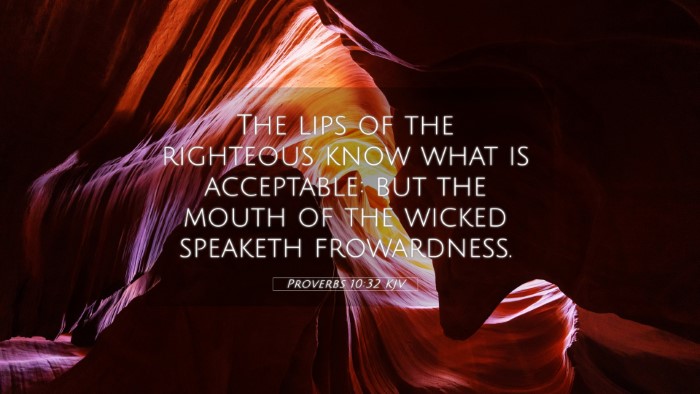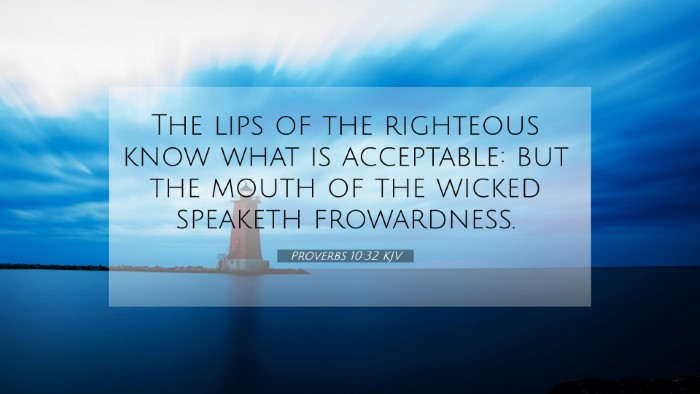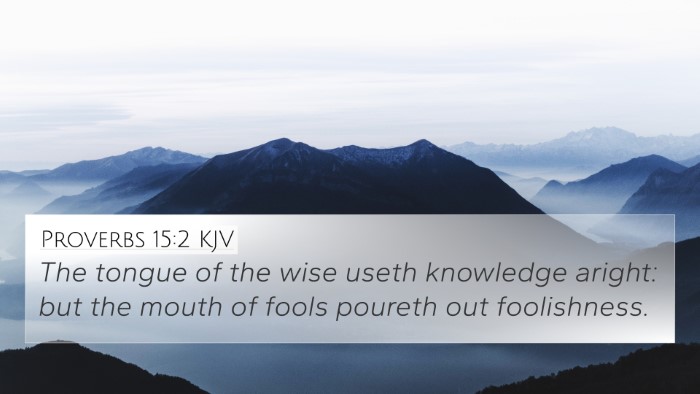Understanding Proverbs 10:32
Proverbs 10:32 states: "The lips of the righteous know what is acceptable: but the mouth of the wicked speaketh frowardness." This verse contrasts the speech of the righteous with that of the wicked, highlighting the moral and ethical differences between these two groups of people.
Summary of the Verse
This verse suggests that the righteous, guided by a moral compass and wisdom from God, understand and communicate what is acceptable in God’s sight, whereas the wicked are inclined to speak deceitfully and treacherously.
Commentary Insights
Matthew Henry's Commentary
Matthew Henry emphasizes the wisdom and discernment of the righteous. He notes that their words are reflective of their inner righteousness, suggesting a divine insight that enables them to recognize what is acceptable and pleasing to God. In contrast, he points out that the wicked speak with a frowardness that stems from their corrupt nature, revealing the state of their hearts.
Albert Barnes' Notes on the Bible
Albert Barnes highlights the idea that the "lips of the righteous" are not only aware of what pleases God but also of the importance of speaking that knowledge. He explains that this verse reiterates the virtue of good speech as a reflection of righteous character. Conversely, he describes the wicked as those who are prone to speaking with malice, thus promoting harmful and false narratives.
Adam Clarke's Commentary
Adam Clarke elaborates on the nature of righteousness and wickedness as shown through speech. He describes the righteous as those who speak with intention and benevolence, reflecting a deep understanding of divine principles. In contrast, Clarke notes that the wicked are driven by foolishness or malice, which corrupts their speech and indulges in negativity.
Cross-References to Proverbs 10:32
To deepen your understanding of Proverbs 10:32, consider these related Bible verses:
- Proverbs 15:2: "The tongue of the wise useth knowledge aright: but the mouth of fools poureth out foolishness." This verse similarly contrasts the speech of the wise and the fool.
- James 3:10: "Out of the same mouth proceedeth blessing and cursing. My brethren, these things ought not so to be." This highlights the importance of the words we choose to speak.
- Psalm 34:13-14: "Keep thy tongue from evil, and thy lips from speaking guile." This speaks to the conduct expected of the righteous.
- Matthew 12:34: "For out of the abundance of the heart the mouth speaketh." This underscores the principle that speech reflects the condition of one’s heart.
- Proverbs 4:24: "Put away from thee a froward mouth, and perverse lips put far from thee." This also deals with the nature of what is said versus what is not.
- Proverbs 20:15: "There is gold, and a multitude of rubies: but the lips of knowledge are a precious jewel." Here, the value of wise speech is emphasized.
- Colossians 4:6: "Let your speech be alway with grace, seasoned with salt, that ye may know how ye ought to answer every man." This instructs on the quality of speech one should have.
Thematic Connections and Insights
The thematic connections between these verses reveal a sound biblical principle: the significance of speech in reflecting one’s character and relationship with God. Each verse underscores the imperative of using one's words wisely and morally.
This analysis encourages readers to engage in Comparative Bible verse analysis and explore connections between Bible verses, thus enhancing their understanding of Biblical teachings.
Utilizing Cross-References Effectively
Utilizing tools for Bible cross-referencing can aid in drawing parallels, enriching your personal Bible study. Consider using a Bible concordance or Bible cross-reference guide to explore the interconnectivity of scripture.
Conclusion
In summary, Proverbs 10:32 serves as a powerful reminder of the importance of speech in our lives. By contrasting the righteous and the wicked, it compels us to reflect on our words and their implications. Engaging with this verse and its connections provides a comprehensive study of Biblical themes related to speech and morality.













